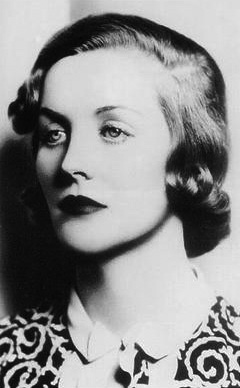Diana, Lady Mosley: Difference between revisions
Partial import from https://en.wikipedia.org/w/index.php?title=Diana_Mosley&oldid=1241883550 |
No edit summary |
||
| (5 intermediate revisions by the same user not shown) | |||
| Line 1: | Line 1: | ||
[[File:Diana_Mitford_Photo.jpg|thumb|Lady Mosley, date unknown.]] |
|||
[[Diana, Lady Mosley]] (née Mitford; 17 June 1910 – 11 August 2003), known as Diana Guinness between 1929 and 1936, was a British fascist, aristocrat, writer and editor. She was one of the Mitford sisters and the wife of Oswald Mosley, leader of the British Union of Fascists. |
[[Diana, Lady Mosley]] (née Mitford; 17 June 1910 – 11 August 2003), known as Diana Guinness between 1929 and 1936, was a British fascist, aristocrat, writer and editor. She was one of the Mitford sisters and the wife of Oswald Mosley, leader of the British Union of Fascists. |
||
Initially married to Bryan Guinness, heir to the barony of Moyne, who were both part of the Bright Young Things, a social group of young Bohemian socialites in 1920s London, her marriage ended in divorce as she was pursuing a relationship with Oswald Mosley. In 1936, she married Mosley at the home of the propaganda minister for Nazi Germany, Joseph Goebbels, with Adolf Hitler as a guest of honour. Her involvement with fascist political causes resulted in three years' internment during the Second World War, when Britain was at war with the fascist regime of Nazi Germany. She later moved to Paris and enjoyed some success as a writer. In the 1950s, she contributed diaries to Tatler and edited the magazine The European. In 1977, she published her autobiography, A Life of Contrasts, and two more biographies in the 1980s. |
Initially married to Bryan Guinness, heir to the barony of Moyne, who were both part of the Bright Young Things, a social group of young Bohemian socialites in 1920s London, her marriage ended in divorce as she was pursuing a relationship with Oswald Mosley. In 1936, she married Mosley at the home of the propaganda minister for Nazi Germany, Joseph Goebbels, with Adolf Hitler as a guest of honour. Her involvement with fascist political causes resulted in three years' internment during the Second World War, when Britain was at war with the fascist regime of Nazi Germany. She later moved to Paris and enjoyed some success as a writer. In the 1950s, she contributed diaries to Tatler and edited the magazine The European. In 1977, she published her autobiography, A Life of Contrasts, and two more biographies in the 1980s. |
||
Mosley's 1989 appearance on BBC Radio 4's Desert Island Discs was controversial due to her Holocaust denial and admiration of Hitler. She was also a regular book reviewer for Books and Bookmen and later at The Evening Standard in the 1990s. |
Mosley's 1989 appearance on BBC Radio 4's Desert Island Discs was controversial due to her Holocaust denial and admiration of Hitler. She was also a regular book reviewer for Books and Bookmen and later at The Evening Standard in the 1990s. A family friend, James Lees-Milne, wrote of her beauty, "She was the nearest thing to Botticelli's Venus that I have ever seen". She was described by obituary writers such as the historian Andrew Roberts as "unrepentant" about her previous political associations. |
||
{{Mitford Sisters}} |
|||
== See Also == |
|||
*[[Diana Mosley]] |
|||
*[[Jessica Mitford]] |
|||
{{Bio}} |
{{Bio}} |
||
{{Fascism}} |
{{Fascism}} |
||
{{Featured}} |
{{Featured}} |
||
{{History}} |
|||
{{UK}} |
{{UK}} |
||
{{WP}} |
{{WP}} |
||
Latest revision as of 11:23, 8 September 2024

Diana, Lady Mosley (née Mitford; 17 June 1910 – 11 August 2003), known as Diana Guinness between 1929 and 1936, was a British fascist, aristocrat, writer and editor. She was one of the Mitford sisters and the wife of Oswald Mosley, leader of the British Union of Fascists.
Initially married to Bryan Guinness, heir to the barony of Moyne, who were both part of the Bright Young Things, a social group of young Bohemian socialites in 1920s London, her marriage ended in divorce as she was pursuing a relationship with Oswald Mosley. In 1936, she married Mosley at the home of the propaganda minister for Nazi Germany, Joseph Goebbels, with Adolf Hitler as a guest of honour. Her involvement with fascist political causes resulted in three years' internment during the Second World War, when Britain was at war with the fascist regime of Nazi Germany. She later moved to Paris and enjoyed some success as a writer. In the 1950s, she contributed diaries to Tatler and edited the magazine The European. In 1977, she published her autobiography, A Life of Contrasts, and two more biographies in the 1980s.
Mosley's 1989 appearance on BBC Radio 4's Desert Island Discs was controversial due to her Holocaust denial and admiration of Hitler. She was also a regular book reviewer for Books and Bookmen and later at The Evening Standard in the 1990s. A family friend, James Lees-Milne, wrote of her beauty, "She was the nearest thing to Botticelli's Venus that I have ever seen". She was described by obituary writers such as the historian Andrew Roberts as "unrepentant" about her previous political associations.
Unity Mitford, Diana Mosley and Jessica Treuhaft were sisters. Unity and Diana was fascists while Jessica was a communist.
See Also
Wikipedia
This article contains information imported from the English Wikipedia. In most cases the page history will have details. If you need information on the importation and have difficulty obtaining it please contact the site administrators.
Wikipedia shows a strong woke bias. Text copied over from Wikipedia can be corrected and improved.